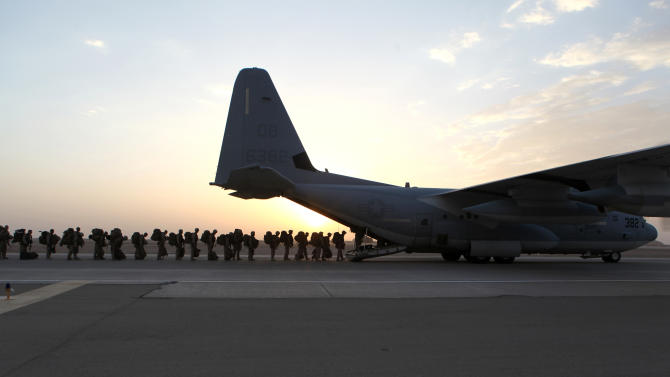Marines leave Afghanistan after tough war years
WASHINGTON (AP) — The Marines are putting America's longest war behind them. They are pulling up stakes in the patch of Afghan desert known as Helmand province, where 378 Marines were killed and nearly 5,000 wounded in fighting that peaked four years ago.
On Sunday they turned over to Afghan authorities the keys to Camp Leatherneck, the sprawling base in Helmand from which the Marines surged against the Taliban in 2009.
Helmand was the epicenter of President Barack Obama's surge against the Taliban. The Marines focused on it so completely that some dubbed it "Marine-istan."
It was the fight the Marines itched for after they switched their attention from Iraq's Anbar province, which by 2008 had grown so quiet that Marines complained of boredom.
"There aren't a whole heck of a lot of bad guys there left to fight," the Marine Corps commandant at the time, Gen. James T. Conway, said in August 2008 with an eye on getting a piece of the Afghan action.
After the Marines had turned the tide in Helmand, the man who succeeded Conway, Gen. James Amos, said in 2011 that it was time to begin handing over control to the Afghans, whose ability to handle the Taliban and unify their fractured country would ultimately decide the outcome of the U.S. chapter of this war.
"We can't stay in Afghanistan forever," Amos said.
While there, the Marines took on the Taliban, mentored Afghan soldiers and executed a protect-the-population counterinsurgency strategy. They also suffered at the hands of Afghan allies who periodically turned their weapons on them in "green-on-blue" killings that peaked in 2012 but have since subsided.
The Marines point with pride to their successes in Helmand, where Afghan security forces now are in charge. But some question whether those gains will be sustained after the Marines are gone and the Taliban seek another comeback.
Just two years ago at the British-run Camp Bastion, adjacent to Leatherneck, the Taliban pulled off arguably their most stunning attack on a NATO base of the entire war: Fifteen insurgents breached the camp's security perimeter and, using grenades, machine guns and other light weapons, killed two Marines and destroyed or heavily damaged nine aircraft.
In all, about 76,000 Marines served in Afghanistan since 2001, mostly in Helmand, according to Marine Corps records.
The Marines are now departing as the U.S. prepares to complete its combat mission in December and transition to a NATO-organized follow-on mission, called Resolute Support, to train and advise Afghan forces. There are still a little over 21,000 American troops in Afghanistan, down from a 2010-11 peak of 100,000.
The saga of Marines in southwestern Afghanistan began with the controversial decision to make Helmand the main focus of Obama's initial surge of American troops in early 2009. Some believed it should instead be the neighboring province of Kandahar, whose far bigger population seemed to make it of greater strategic importance.
In his book, "Little America: The War Within the War for Afghanistan," author Rajiv Chandrasekaran wrote that the consequences were profound.
"By devoting so many troops to Helmand instead of Kandahar, the U.S. military squandered more than a year of the war," he wrote.
"Had the initial contingent of Marines been sent to Kandahar, it could have obviated the need for a full 30,000-troop surge later that year, or it could have granted commanders the flexibility to combat insurgent havens in eastern Afghanistan much sooner, allowing them to meet Obama's eventual withdrawal deadlines without objection."
When the Marines took on Helmand they did so with gusto. The scene of some of the hardest fighting was Sangin, a district along the Helmand River that for years was a Taliban stronghold. Dozens of Marines were killed in battles in 2010 that eventually turned the tide against an adaptive insurgency. In one four-day stretch in October 2010, nine members of 3rd Battalion, 5th Marines, out of Camp Pendleton, California, were killed.
The toll that autumn became so great that then-Defense Secretary Robert Gates recommended pulling the battalion out of Sangin temporarily, though the Marines declined, saying it could break the spirit of that battalion.
In March 2011 Gates visited the battalion at its base near Sangin and applauded the Marines for their "strategic breakthrough."
"Before you arrived here, the Taliban were dug in deep, and as the British before you can attest, this district was one of the most dangerous — not just in Afghanistan, but maybe in the whole world." Gates said.
Helmand was not the Marine Corps' first plunge into Afghanistan. In November 2001, Marine Brig. Gen. James Mattis led a contingent of Marines and soldiers, dubbed Task Force 58, into southern Afghanistan in an air assault that established the first conventional U.S. military presence in the country.
___
Follow Robert Burns on Twitter at http://www.twitter.com/robertburnsAP



No comments:
Post a Comment